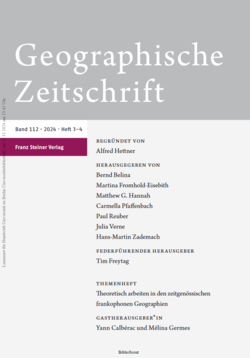Dr. Yann Calbérac | Associated Researcher
Former Member
Home Institution
:
Université de Reims Champagne-Ardenne
|
Position
:
Lecturer
Junior fellow of the Institut universitaire de France (2019-2024)
|
Disciplines
:
Geography
|
Biography
Yann Calbérac is an alumnus of the École normale superieure de Lyon (2001) and the University of Lyon 2 where he defended his PhD in 2010. He is now Associate Professor at the University of Reims, and he is a junior fellow of the Institut universitaire de France. He mainly works on history of geography and social sciences, but also on a geographical approach of performing arts.
Spatial metaphor filtered through the prism of spatial turn
Nowadays, societies have to face with massive transformation that deeply affect them, such as the growth of population, urban sprawl, the raise of mobilities, the development of telecommunication, the political mutations and the raise of neo-liberalism, the ecological issue… Humanities and human sciences are more than never requested to analyze those transformations, not taking into account a catastrophist point of view, but a balanced on. As a matter of fact, scientists are eager to decipher those dynamics by creating new frames and tools to scope on societies: they no longer care to the future of societies and they mainly pay attention to the nowadays complexity of societies. Recent authors coming from various fields of social sciences are looking for landmarks, such as Bruno Latour who wonders in his essay Où atterrir ? how to found an orientation in politics (Latour, 2017). Yves Citton in Contre-courants politiques (Citton, 2018) tries to renew political imaginary by proposing new polarities. Last, Lionel Ruffel (Ruffel, 2016) aims at unraveling the various significations of the word contemporain (contemporary) by exploring the places where contemporary is defined and discussed. Last, to explain the evolution of political ideas, Razmig Keucheyan (Keucheyan, 2017) propose to map new left. As shown, social scientists – including those not coming from geography – are eager to use spatial references, that raises three main problems:
- The use of “positional metaphors” (Grataloup, 1996, 68) reveals “a spatial paradigm in social sciences” (Jacob, 2014, 43) that is dominant, even outside geography, architecture or urbanism, the sciences that are eager to theorize space. This evolution is called spatial turn (Arias 2010).
- As shown by Christian Jacob (Jacob, 2014), we should scrutinize this spatial reference: is it really a theory of space, or just a metaphor? I assume it is a metaphor that should be examined, in order to test the spatial turn that provokes the raise of spatial metaphors.
- Last, the massive use of spatial metaphors questions the position, among the field of social sciences, of the geography, the science that has proposed to theorize space: how has geography reacted when confronted to the spatial turn (Stock, 2008)
The statement Michel Foucault has written in 1964 - « L’espace est dans le langage d’aujourd’hui la plus obsédante des métaphores » (Foucault 1994, 407) – has never been so accurate!. That’s why this project aimed at revealing the epistemological issues that enabled spatial turn to occur (1), by proposing a theory of spatial metaphor: the latter is not only relevant to understand the metaphorization of space in contemporary social sciences, but mainly to define metaphor as the way to think after the postmodern turn has occurred (2). To achieve this goal, I assume to borrow approaches and tools to geography (3).
Geographische Zeitschrift Band 112, September 2024, Heft 3-4 Erscheinungsdatum: 26.09.2024
September 26, 2024Yann Calbérac , Mélina Germes
Publications
The complete list of publications is available here : https://cv.hal.science/yann-calberac
